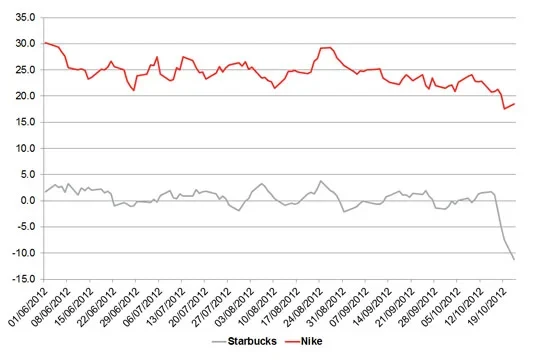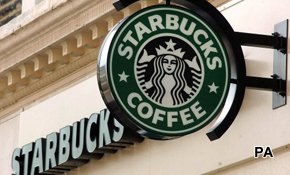We have recently seen two of the world’s biggest brands hit by potential PR crises.
First up was Nike, which first continued to support and then ended their sponsorship of cyclist Lance Armstrong in the wake of doping revelations, followed shortly afterwards by ubiquitous coffee chain Starbucks, which was hit by allegations of (legally) avoiding tax in the UK.
YouGov’s BrandIndex shows that both have suffered reputational damage but, in the short-term at least, Starbucks has been hurt more than Nike.
Buzz, which looks at whether people are hearing positive or negative news about a brand, fell for both of the companies in question. Nike declined from around the +10 mark to as low as -3, before making a slight recovery.
Meanwhile, Starbucks saw a more dramatic drop from 0 to -25 on Monday, with no sign yet of a levelling off of the drop.
This pattern is reflected in brand perceptions as well – the Index score (a composite of six key image attributes) dropped slightly for Nike from +24 just before the Armstrong allegations exploded to the +18 mark now.
Starbucks fell more sharply from +1 to -11 and again, as the decline has not yet been arrested, there is potentially more to come.

Both stories have a while to run before we know their full impact, but as of now it looks like the damage to Starbucks is much greater than for Nike.
Nike outruns the story
There are a couple of factors that might explain why these two crises had different impacts.
Nike’s involvement was merely a part of the bigger problem of doping in sports, and its public relations staff made efforts to acknowledge and react to this (albeit a bit later than they could have).
Starbucks, meanwhile, has so far failed to act decisively to stem the negative coverage that has resulted from these stories, leaving open the risk that an irresistible head of steam could build up underneath the growing chatter surrounding the issue.
The lesson for brands is that a direct hit is likely to be worse than being caught in collateral damage, and a fast response to get on top of the story can mitigate some of the effects.









